November/December: A Literal World of Dreams Come True
Inside: Web Summit 2023, improving astronauts' health in space and chatting with a Nobel Prize Winner!
Yes, the title is cheesy. So, sue me.
If you told me two months ago that I had just experienced all of these wonderful, amazing, worldview-shattering things, I probably would have run out of whatever room I was in, flabbergasted.
Yes, flabbergasted.
Over the last 60 days, give or take a few, I’ve learned an incredible amount from the people around me and the amazing places I’ve been.
Now, if you know me and my writing style, my intros are usually waaaay longer than this, but Substack’s email length limit doesn’t seem to be taking pity on me so we’re cutting this one a bit short. Straight to the point, I’ve had a cool last eight weeks.
Without further ado, I think it’s time we get on with the news part of the newsletter!
🎤 Speaking at Web Summit Lisbon
The conference
Wow, that’s sure some headliner. But, yes it’s true — as I’m writing this, about a month ago I spoke at Web Summit 2023 in Lisbon, Portugal. A memorable experience, to say the very least.
Each year Web Summit brings together 75 000+ influential people across all fields of emerging tech and the vast world of business for a memorable 4-day event at the one and only Altice Arena and its 5 neighboring pavillions.
Web Summit has long been considered the largest tech conference in the European continent and one of the largest in the world! So, you can only imagine my excitement when I found out I would be flying halfway across the world to chat with Shell executives on a panel about renewables and sustainability.
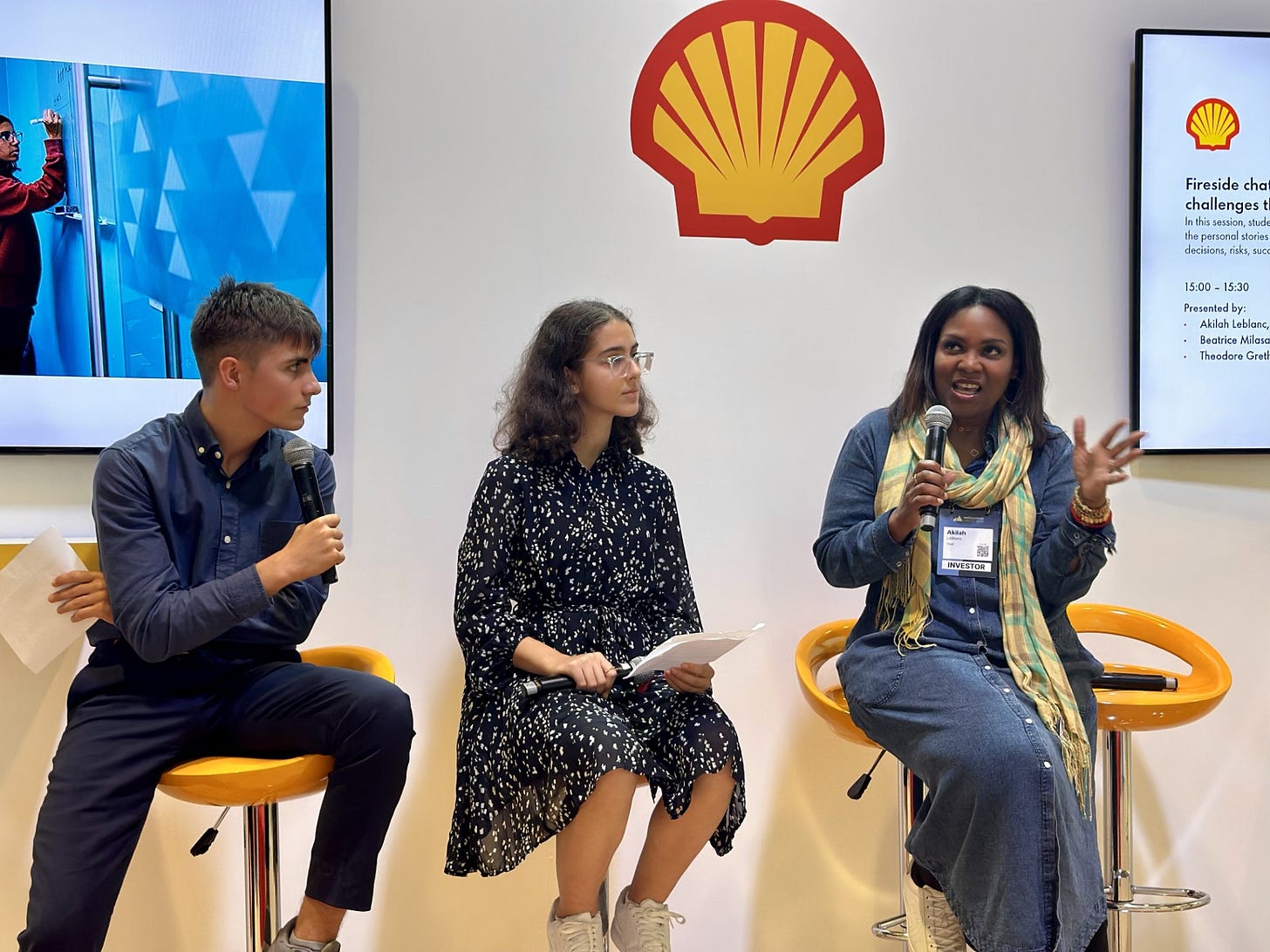
Here are my top three learnings/insights from this worldview-shattering opportunity:
1— Be present, live in the moment
I had received this piece of advice prior to heading out to Lisbon, but I don't think the impact of these words truly sunk in until I began to reflect on my trip just a few days ago. You miss so much when you miss the small details. If you’re mentally somewhere else, zoned out you don’t just miss the bustling energy of the environment around you, you miss a part of the experience entirely.
If you’re stuck in your thoughts or constantly tied to technology you’ll never visit the places around you, you’ll just see them. You won’t feel all those feelings you were meant to feel when you first laid eyes on the beauty of the natural world around you.
You won’t bond with the people around you or get to know them on a deeper level if you’re not there. If you’re not present and you’re too busy worrying about the future or thinking about the past you’ll miss the here. The now. You won’t embrace new experiences and you’ll be stuck in your old way of thinking as if the event had never happened in the first place.
Awesome memories, awesome people, awesome places, don’t exist if you’re not there to witness them.
2— People want to talk to you
Being the only 15-year-old at a conference can feel extremely alienating at first. It sort of feels like you were dropped on another planet. A planet of intimidating people who are all taller than you.
On my first day at the conference, I was so nervous to go up and talk to people there—these people all seemed so knowledgeable about their fields and what direction they were headed in. (Spoiler alert: most of them didn’t have a clear career path in mind. Most of them didn’t have it all figured out, and I realized that people rarely do. No one is perfect.)
But the same question kept repeating over and over again in my mind nonetheless. Why would they want to talk to a 15-year-old when they could be chatting with VCs getting funding for their startup or attending a speaker panel that might benefit them?
There were so many better things they could be doing with their time, after all.
But instead of worrying about something when I could just not, I decided to reframe that thought. What can I do to provide value to conversations?
Another thing I realized is that it’s just a 15-minute conversation sometimes and that’s alright. You’re not going to spend hours talking with every single person that you meet, and if you don’t vibe with someone you can just leave and never have to see them again. There are literally no downsides.
The only thing holding you back is yourself — who cares what other people think or how you are percieved? What good does worrying about stuff like that even do for you? Most of the time, not much.
3— Assumptions are just baseless claims based on internal biases that do nothing for you
Assumptions can be some of the most limiting mistakes you make.
“I’m not going to take that opportunity because it doesn’t align with what I think my dream job will be at this moment in time.”
“I’m not going to network with that person because I’m not a ‘healthcare person’ and I prefer space and astrophysics.” (Yes, I did, in fact, call myself out here, move along now…)
But aside from assumptions about yourself, what about assumptions about other people? While at Web Summit, for one of the four days of the conference, we had the opportunity to gain access to the Forum lounge—one of the more VIP areas where the main stage speakers hang out with the famous Lisbon soccer players and where C-tier executives of huge companies come in abundance. I’m not going to lie to you, I was intimidated as hell. I think at one point even the President of Portugal showed up and with all the craziness around me I was sweating through my shirt.
Then I had a conversation with Una, one of the adults that was with us on the trip. I told her that I was nervous to go up to people at the Forum lounge compared to other people at the main area of the conference because these people were important rich and confident.
She asked me, “What makes you think these people are more important?”
I was confused about what she meant by that. They were important because they had money and influence, therefore they had power.
All she did was stare at me and I instantly started to question my thought process because that didn’t sound right. I knew I was missing something.
Fast forward a few thoughts later, I figured it out: It’s all made up. My answer wasn’t even remotely related to the value of the individual. These happened to be the things that society held at a higher value, however, that didn’t say anything about the importance of the individual. Just because someone had paid some extra bucks to hang around the VIP lounge did not intrinsically mean they were more important than anyone else at the conference or that they would always provide more value.
And this would also later be applied to a Shell networking event we were invited to. Just because people have a certain title, it doesn’t automatically make them more or less important people. At the end of the day, we’re all just people, aren’t we?
Off-duty exploration
While visiting such a beautiful city it would have been incredibly stupid of us to not have had at least one day set aside for sightseeing and activities. A major highlight is visiting what might be the best—the most authentic—Portuguese tart place in the world every single morning of our trip. And, let me tell you Substack audience, you have not lived until you have tasted a Portuguese tart in Portugal. None of that refrigerated stuff from Costco, these were the real deal. (If I wanted to I could write a whole newsletter issue simply describing how these tarts melted in your mouth and how well the cinnamon paired with their angelic sweetness.)
But aside from fawning over these tarts and exploring the bustling city life on a day-to-day basis, my two favourite highlights from this trip include a visit to the National Palace of Pena in Sintra and visiting the dreamy coast of Cascais—which I still haven’t learned how to pronounce properly. 😅 (Goes something like ‘kash-ki-eesh’ if I remember correctly…)
There was so much to see and do but none of it would have been the same without the people! I’d just like to take a moment to thank…
First of all, Ian Lockhart—I felt so privileged to have been able to learn from you and your life experiences. It always felt like every single conversation was infused with years’ worth of knowledge and life lessons, and I have no doubt that learning about things like assessing the value of a startup, how to maximize serendipity, and how to make the most of events like these at such a young age was an invaluable experience. You also helped me realize the power of having a good, solid network to rely on both in and outside of TKS, and you taught me that the people are what matters most. I know that’s a piece of advice I’ll definitely carry with me for my whole life.
Una Lounder—Thank you for always being there to listen. I was able to understand myself so much better from our conversations and I learned so much from you about meaningful intention setting. You taught me so much about various networking styles, as well as what I can do to stand out when I’m meeting new people. I truly don’t know what I would have done without you on that first evening—thank you for guiding me through my first official conference (and for buying me that delicious chocolate crepe)!
Also, thanks to Theodore Grether-Murray for the positivity and chaos you brought to the trip as well as for being a great panel co-host. I loved our convos and I’m grateful for all the advice you gave me throughout the trip. Thanks for always hyping me up and best of luck with your pivot to AI! Can’t wait to see what you create in the space.
And last but not least, thanks to Marta Bernandino for being an amazing human being and friend — it was lovely meeting you in Lisbon and I had a blast getting to know you better! I can’t wait to see where your tree-planting robot goes and I’m so happy we got to meet in person!
🎧 Hosting a Podcast Interview with a Nobel Prize Winning Astronomer
Your first thought right now is probably — what? How did a 15-year-old host a podcast interview with a Nobel Prize Winner? How does that even happen?
Well, let’s roll it back. Around March of 2023, Jula He and I co-founded the Curious Minds podcast: a place for teenagers and young adults to be able to learn about unique career paths within the spaces of emerging tech and business. Then, a few months later in late June, I was invited to attend the Villars Symposium hosted by the Villars Institute as a fellow there. And that’s where I met none other than Didier Queloz.
Didier Queloz, PhD in Astronomy, Physics Nobel Prize Winner for the discovery of exoplanets. Didier and his colleague Michel Mayor are the reason that we know there are planets beyond the ones in our solar system and the reason that we can observe them and maybe even visit them one day!
Being able to chat with someone so knowledgeable taught me so many things. Even aside from learning about the habitability of other planets or the various methods we use to discover distant exoplanets or stars, Didier had so many valuable insights on the power of being curious and following your intrinsic curiosities! He told us that the people who pursue what they naturally gravitate toward never feel like they have to work a day in their lives because every day they get to wake up doing what they love, and because of this they’re usually pretty good at it.
But enough spoilers about what went on in the interview—if I’ve spiked your interest you can click play below and listen to Episode 13 of the Curious Minds podcast for yourself!
🌌 Mitigating Negative Health Effects for Astronauts with Magnetic Nanoparticles (MNPs)
For the longest time, we’ve had two main barriers to exploring space. The first is the state of our available resources. The second is the various health effects associated with space travel. That part isn’t spoken about as much.
Why?
Well, it kind of ruins the glory, doesn’t it? When we think of space exploration we think of space exploration we think of brave heroes who’ve been training tirelessly for travel in outer space, and while they do exactly just that, going to space (especially for prolonged periods of time) does not come without consequence.
So, what exactly does all this gibberish in my section title mean? We’ll get there in a second.
One of the biggest specific health-related challenges to sustaining human life in space long-term is the noticeable deterioration in bone mass among astronauts in space. The loss of bone mass occurs in microgravity because our bones no longer need to support our bodies against the pull of gravity. While we are still on Earth, our bodies are subject to the constant mechanical load that is gravity twenty-four hours a day, seven days a week, so we have the luxury of not having to deal with that.
However, when you remove that constant daily "exercise" for our skeletal structure, we begin to notice a shrinking from what we consider healthy bone mass. In space, astronauts lose, on average, a shocking 1–2% of their bone mineral density (BMD) per month.
This is commonly observed aboard the International Space Station (ISS) during shorter timeframes such as a few months to a year or two.
Now, the trouble comes when we look long-term. After six months in space, astronauts have the potential to lose an average of 10% in bone mineral density (BMD), causing a series of disastrous health effects.
So, that’s not great.
Being hurt by how this issue limits human spaceflight potential, wrote a paper outlining what exactly is the problem at hand here, and how can we leverage modern nanomedicine to put an end to it for good.
Aaaaand, that’s a wrap on my last update for 2023! 🎬 As always thanks for following along and I’ll see you again in a few months for my January/February update!
✉️ Personal links
Scroll through my small business website → view the shop ✨
Listen to the Curious Minds podcast → click here 🎧
Explore my Medium profile → take me to the land of articles 📰
Find me on LinkedIn → view my profile 👀

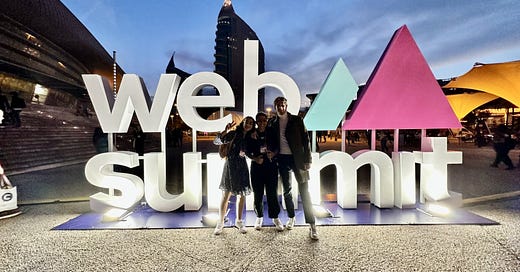


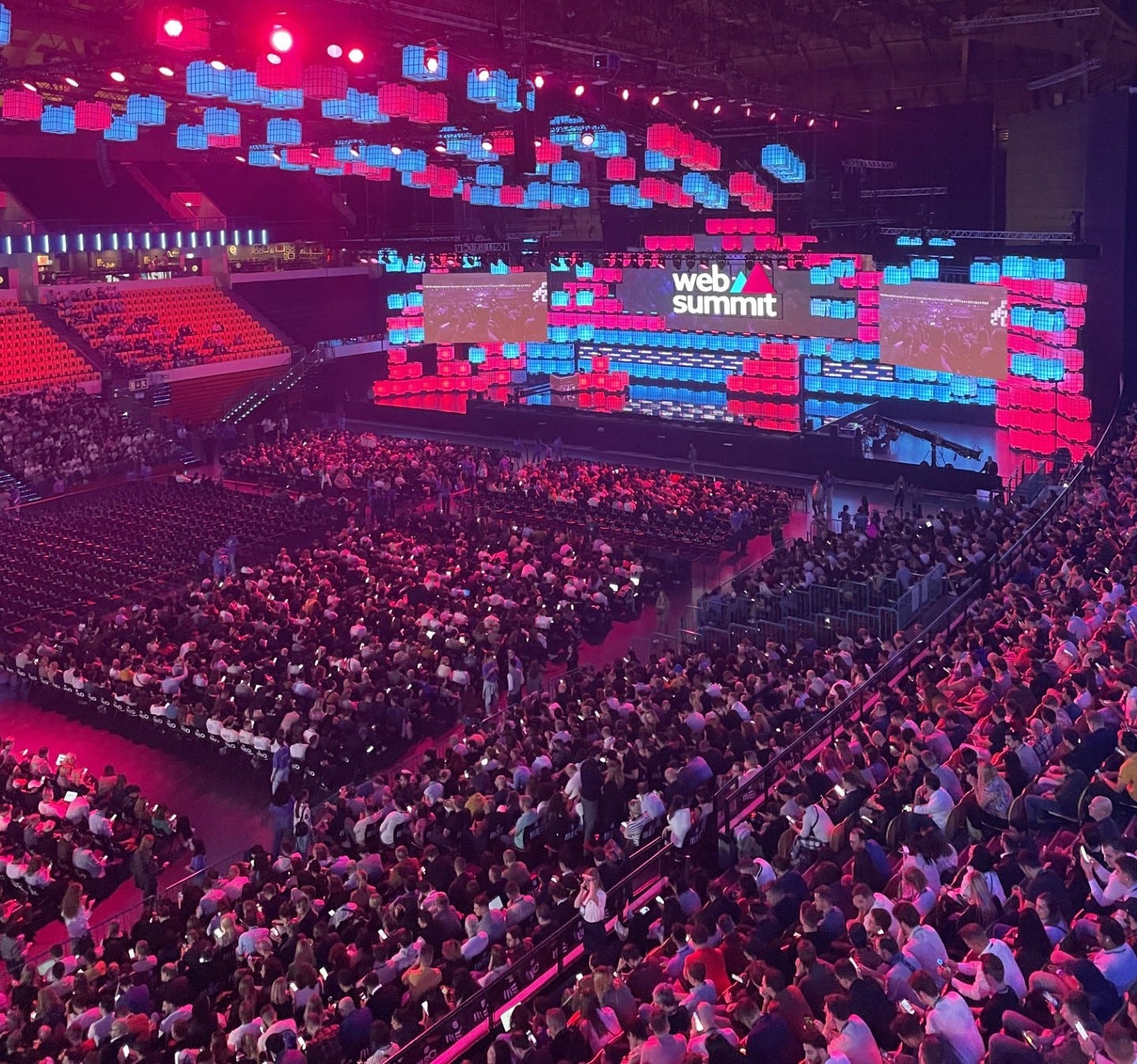



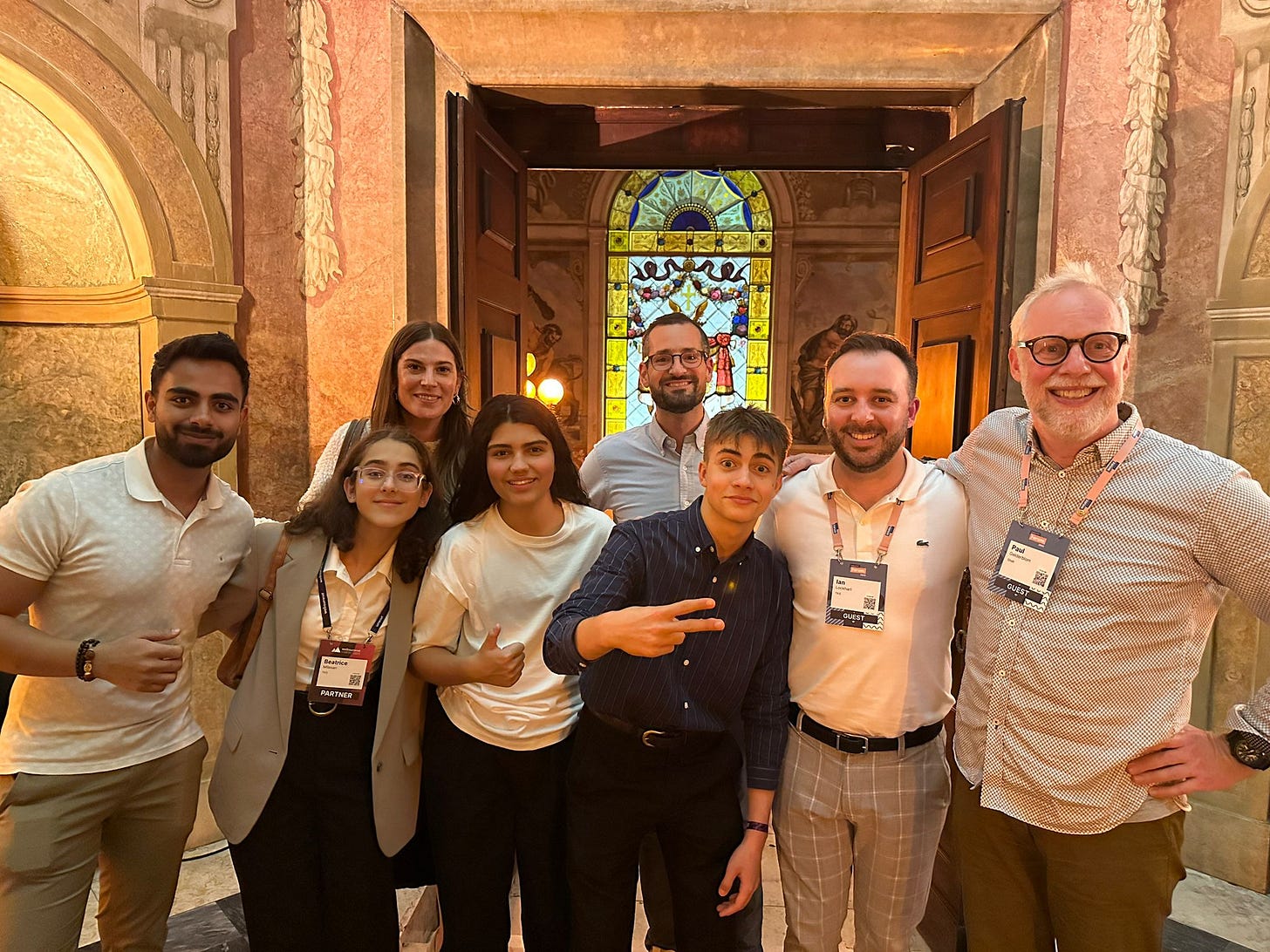

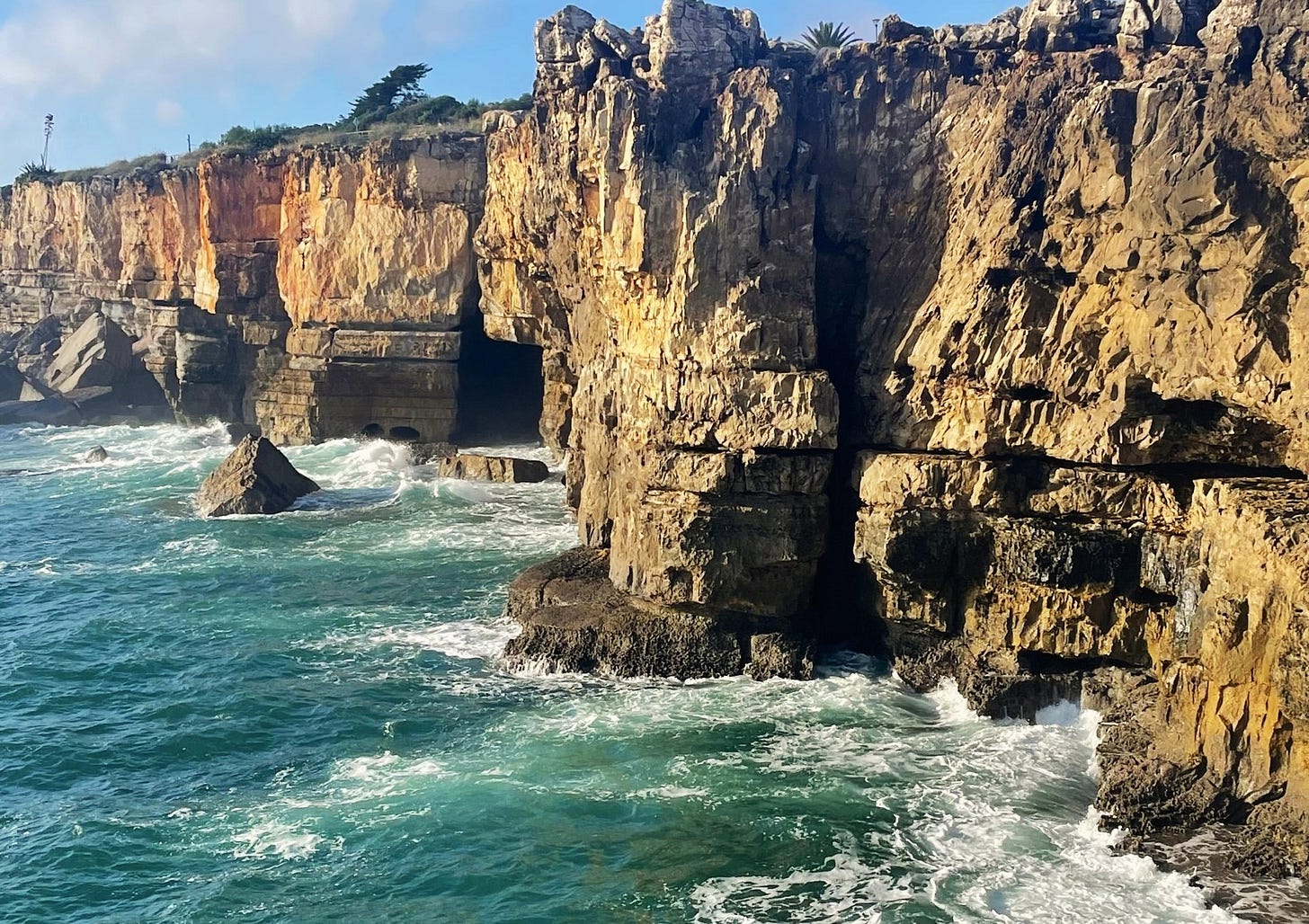
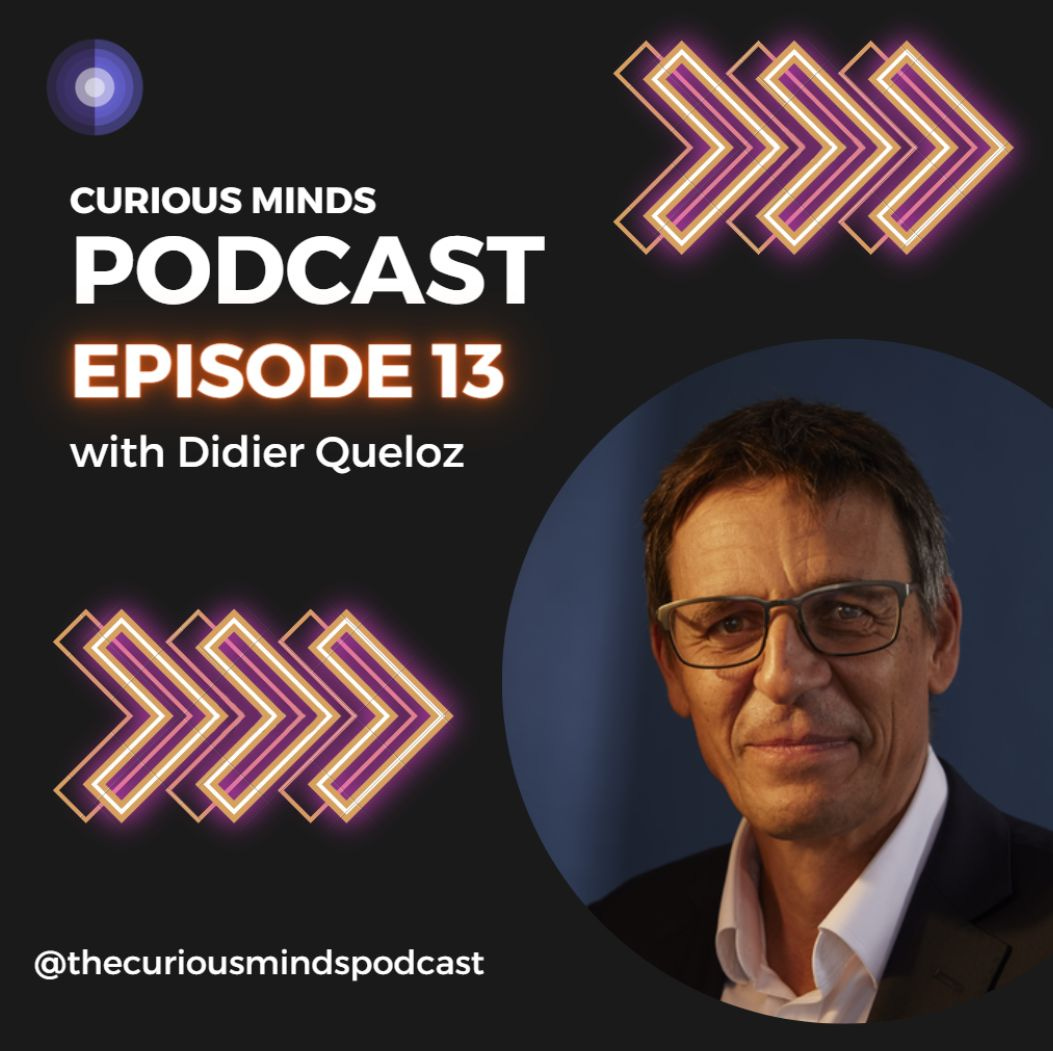


So proud of all the amazing things you are doing!!
Love your takeaways and congrats on such eventful two months!!